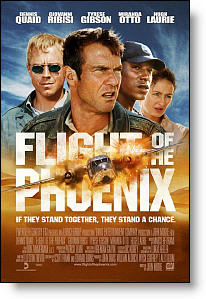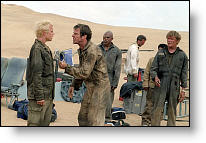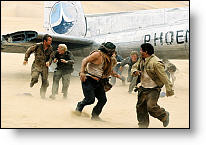The Flight of the Phoenix
 for some language, action and violence.
for some language, action and violence.
Reviewed by: Keith Howland
CONTRIBUTOR
| Moral Rating: | Average |
| Moviemaking Quality: |
|
| Primary Audience: | Adults |
| Genre: | Action Thriller |
| Length: | 1 hr. 45 min. |
| Year of Release: | 2004 |
| USA Release: |



| Featuring |
|---|
| Dennis Quaid, Giovanni Ribisi, Miranda Otto, Hugh Laurie, Jared Padalecki |
| Director |
|
John Moore |
| Producer |
| William Aldrich, Alex Blum, Wyck Godfrey, John Davis |
| Distributor |
“The only way out is up.”
You may know the story already, because “The Flight of the Phoenix” was filmed before in 1966, starring James Stewart and Richard Attenborough. This time, there are better visual effects, a woman in the cast, and worse language, but the story remains essentially the same: A plane carrying the crew and cargo from an abandoned outpost in Mongolia crashes during a sandstorm in the Gobi Desert, stranding all aboard with little hope of being found and less hope of survival if they are not. Food and water are in short supply, the sun is hot, and there may be murderous smugglers in the vicinity. The stranded party is at least two hundred miles from the nearest town, and the plane is too damaged to ever fly again. Or is it…?
The plot is perhaps more driven by events that befall the characters than by interactions between them, but there are interpersonal frictions nonetheless. People react differently to extreme circumstances, and these differences create conflict beyond the perils of heat, dehydration and sandstorms. Egos clash, especially among those with the greatest influence in the group: The pilot, Captain Frank Towns (Dennis Quaid) and Elliot (Giovanni Ribisi), the man with the most viable plan for their continued survival.
The rest of the people represent a mixture of genders, nationalities, and rank (there is one company executive betwixt the pilot, cook, and other manual laborers), but thankfully the film does not descend to predictable clashes between any of these surface distinctions. Rather, it divides virtue and vice fairly well between them and never suggests that any sort of person has a corner on either. (This is nice, since too many films depict ruthless upper class twits in contrast with heart-of-gold working class yokels, etc.)
Most interesting, though, is how the filmmakers demonstrate that vices are most unbecoming in the people to whom we turn to be our heroes. When a plane and its passengers are in trouble, everyone expects guidance from their captain, but Towns is more reticent than anyone to give it. Then, when Elliot becomes the de facto leader as the executor of the escape plan, he shortly reveals himself to be the basest, most selfish person in the bunch. This is what lends the drama its greatest spice and elevates it above a pedestrian exercise in worst-case-scenario survival techniques.

There is much to recommend this film. It may at times veer towards hokiness, and I feared early on that it would be predictable, but it turned out not to be (except for the inevitable conclusion). The visuals are nice, with an impressive plane crash and beautiful desert scenery. The performances are all reasonably good, too. Despite a woman present amidst the stranded (Miranda Otto, best known as Eowyn in “The Lord of the Rings: The Two Towers” and “The Return of the King”), there is no time for romance in the film, which may disappoint some, but leaves no room for gratuitous sex or nudity. (There is some brief innuendo, though.)
As far as detractions go, most of the characters utter profanities or use the name of the Lord vainly. Violence is only occasionally excessive, as the filmmakers mostly do not dwell on the harsher details of the marooned party’s sufferings. There is occasional talk of jinxes regarding their predicament, but the conclusion of this talk seems to be that jinxes are unreal.
There is much in the film to engender good discussion regarding faith, theology, and other spiritual matters. To refer to them all may spoil the plot a bit, but some mention should be made here. At one point a character says, “A man needs only one thing in life: someone to love.” This emphasis on love is good. All people need love: to give and receive it. Specifically, they need the love of God. All human beings are made in God’s image (Genesis 1:27) and God is love (I John 4:8). All humans have rebelled against God and failed to live according to His will (Romans 3:23), but God loves us so much that He has sought to redeem us through Christ’s sacrifice on the cross (I John 3:16); and through Christ the redeemed are able to love as they ought, “because He first loved us” (I John 4:19).
At another point in the film, a character prays before eating his daily allotment of canned peaches. Someone questions his continued faith in light of their predicament, but he replies, “We’re still alive.” This man models the biblical exhortation to pray without ceasing and be thankful in all circumstances (I Thessalonians 5:17-18).
Still later in the film, the plan for survival is well underway. The man who previously questioned another’s prayer is giving their airplane a new name: Phoenix, after the bird of Egyptian mythology that was consumed with fire yet arose from the ashes to live again. This man derides religion because “religion divides people.” But he goes on to say that what everyone needs is something they can hope in to unite them. This man would dismiss Christianity as a divisive religion, but he is close to the ultimate Truth: Jesus Christ, the One who died to take upon Himself the punishment for humanity’s sin (II Corinthians 5:21; I Peter 3:18) and rose from the grave that all who believe in Him might have new life (I Corinthians 15:3-4; John 3:16), is the only One in whom humanity has real hope (Acts 4:12), and the One in whom all the redeemed are united in this life and in the age to come (Philippians 2:9-11; Revelation 5).
As the prophet Isaiah wrote, all those who trust in the Lord-who were once broken and stranded without hope in a barren wilderness-“will mount up with wings like eagles” (Isaiah 40:31).
Violence: Moderate / Profanity: Heavy / Sex/Nudity: None


[Better than Average/3½]
[Better than Average/4]
[Average/3]
[Average]
Kelly certainly grew in stature by humbling herself. It was refreshing that they didn’t take the only woman in the film and make any sexual references or relationships out of it. She added a nice twist to the plot. Overall, this was a very enjoyable movie and will be fun to rent on DVD.
[Better than Average/3½]
[Offensive/2]
[Average/4]
[Better than Average/4]
[Better than Average/5]

My Ratings: [Better than Average/3]